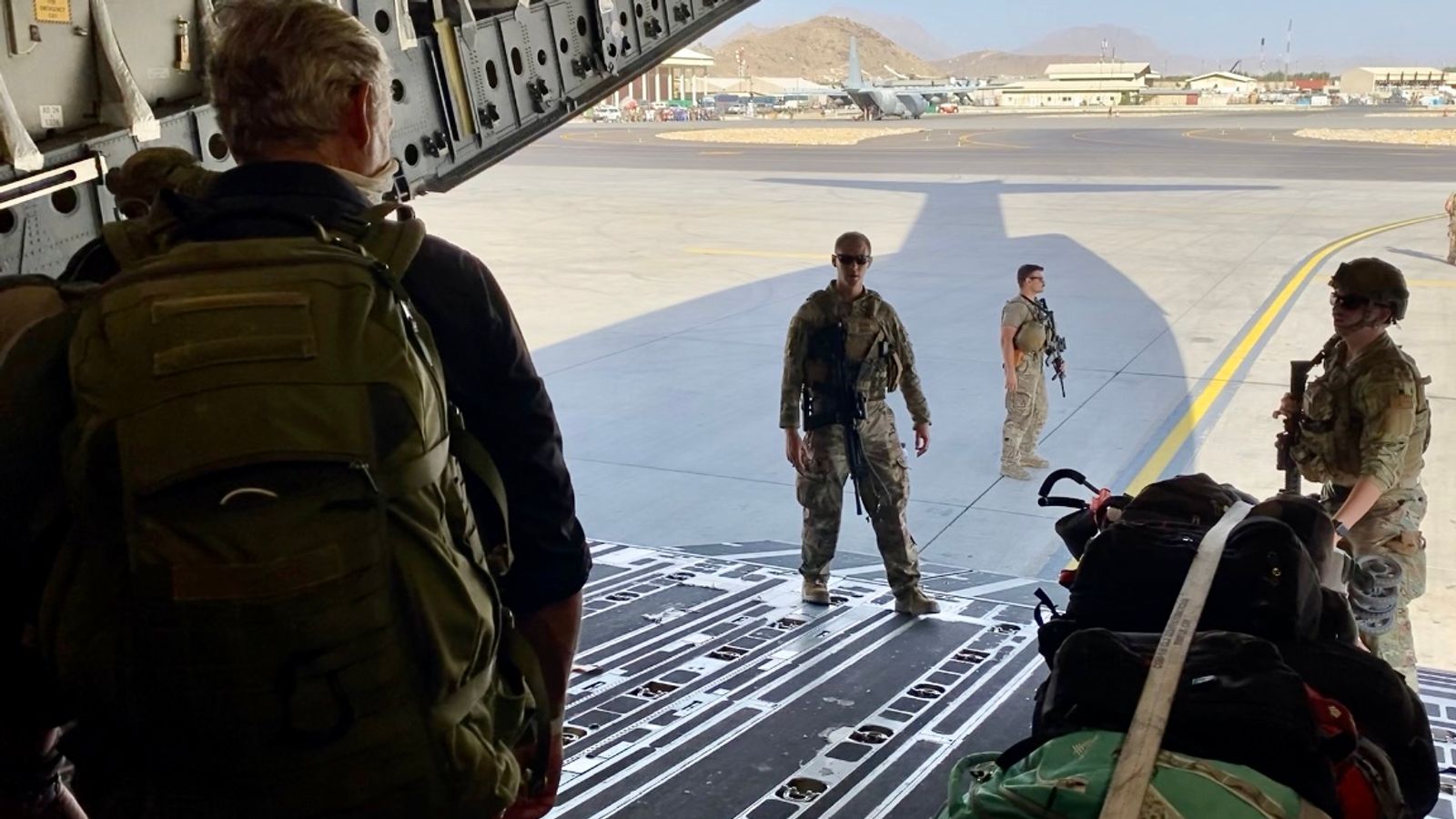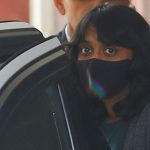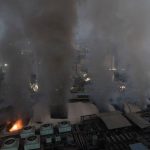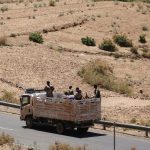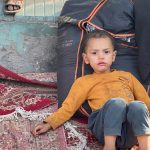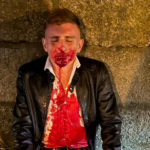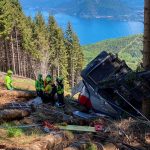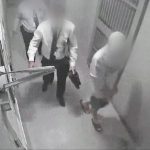Sky’s chief correspondent Stuart Ramsay has spent a number of days reporting on the desperation of thousands of Afghans trying to flee their country after the Taliban took control.
He has now left and shares his thoughts on what he experienced at Kabul airport this month.
His piece was written before the area was hit by two explosions today, resulting in multiple fatalities and injuries.
Read latest updates on the blasts
Please use Chrome browser for a more accessible video player
“Come on Toby! They are going,” I shouted to Sky camera operator Toby Nash.
He was taking a picture of a company from 3 Para; they had asked for a photograph before withdrawing from the British evacuation base they had helped secure for the past week.
Their comrades and rivals from 2 Para, the lead team in this operation, had their picture taken the day before.
The point is they were leaving. It wasn’t public, we couldn’t report it for security reasons, but this was the end game happening in front of us.
All the time, even as Toby’s camera shutter clicked away, I could hear the sounds of thousands of people just yards from us begging to be heard, pleading for a chance to leave Afghanistan.
Toby was late because we were being kicked out of the camp and were joining a convoy to the airport proper.
The operational commanders wanted us to stay to the very end and leave with them, but the orders to remove us came from the MoD or from Whitehall, or both.
We had fought to stay for days but ultimately we found ourselves on a military base and we were being ejected – there is nothing you can do.
It was all conducted in a cordial manner, but we WERE kicked out.
I suspect the prospect of the withdrawal being filmed in heart-breaking detail was a risk the government wasn’t prepared to take, because this will end badly for thousands, I guarantee it.
And so to the convoy.
Only 72 hours earlier, I had joined the process to document the passage to safety for a group of 60 or so evacuees.
The timeline is important. Three days ago I had filmed the process. Three days later the soldiers were packing to leave.
No end of news conferences and ministerial interviews will hide the fact that any of the discussions about 31 August deadlines or extensions were hiding some basic truths:
The Taliban are in control, the Western powers have little influence and the tens, even hundreds, of thousands, who had legitimate rights and expectations to be protected and removed by their former employers, are being abandoned.
So we loaded up and moved out.
We felt guilty we were leaving – myself, my producer Dominique, Sky colleague Martin, and Toby. An easy exit for a group of journalists guaranteed safety by our soldiers and our governments.
I’ll take the jibes and the scorn for leaving.
But I will say this: if we hadn’t been there, nobody would have seen any of the scenes of horror and desperation that have engulfed this entire operation, none of the incredible work by the British military, and the Foreign and Home Office staff.
Through the gates of the compound, the convoy made its usual way past the hundreds gathered around the entrance.
To the left, the sea containers still helped stop the crowds from piling through. Where the paras used to be in control, the Taliban, now supported by their elite Badri 313 brigade, dressed in special forces camouflage and carrying sophisticated weapons, were in charge.
Turning right, the convoy passed the hundreds knee-deep in sewage, pleading to have their cases heard with soldiers from across the world, looking down into the stinking water six feet below.
On through the fortified Abbey Gate entrance to the airport complex, thousands more people to its right-hand side still waited to join the queue, hands in the air holding passports and paperwork.
I hope this gives you a picture of the sheer awfulness of this; but in truth I know it can’t.
We parted from the British convoy and headed towards the American controlled part of the airport.
The Pentagon says there are 10,000 people waiting to be moved inside the airport. That is INSIDE – forget the far greater numbers outside.
Everywhere one looked, people were sleeping rough, sheltering beneath sheets, waiting for their turn.
An American major came over to talk as we waited to be registered to fly to Qatar.
“This flight is full, but we will squeeze you on if there is room,” he told me.
We waited about seven hours for the flight. It’s not lost on me that some wait days.
The airfield was a tumult of noise. Military aircraft from the world were here taking part. The enormous transporter planes taxied in procession in a dizzying display of air traffic control management.
German, Korean, Australian, USA, RAF, Qatar, Netherlands, Canada, Spain, France – it went on and on.
Then we were called and escorted on to the apron.
In front of us, a queue of people were boarding through the enormous jaws of a C-17 transporter plane.
It was the strangest sensation… walking and joining the line with refugees; watched on, the whole time, by armed soldiers.
They were all uniformly courteous to us and they were, to be fair, to the evacuees. But it felt demeaning to me, and if I felt it, what did the men and women, young and old, proud of their Afghan heritage, feel?
I watched as an elderly couple, holding hands, looked back at the Afghan mountains looming over the airport. Mountains that are the very essence of this country. It seemed to me they were saying goodbye, one last look at their country. They clutched each other for a moment and turned. They will never come back.
The C-17 was absolutely, ridiculously huge. Inside it was like being in a church – vast – and the 450 plus people seemed to disappear when they sat down after boarding.
The lights turned green and the loading boss came on the tanoy.
“Okay everyone, we are taking off, hold on to something.”
And that was it. Deafening noise, no windows, a sensation of movement and then take-off. The hundreds all slipping backwards, holding on to each other as the climb steepened.
In the green light we watched families sit and talk; their children restless at times or asleep, a chatter mixed with faces of anxiety.
In a few hours we landed in Doha. We left our fellow travellers on the runway, split from them by our passports and privilege.
The evacuees were told to sit and wait on the tarmac.
Please use Chrome browser for a more accessible video player
They are fortunate to get out of Afghanistan, for certain, but their lives have been altered immeasurably in just over week.
A bag each is all they have.
They will go to countries, communities and cultures that are utterly alien. But they will survive.
I can’t get the faces of those left behind out of my mind, standing in sewage, pleading for help. I never will.
I spoke to an officer at the Kabul camp shortly before starting to write this.
I asked him what it was like. He told me it was grim and that between 15 and 30 hardcore Taliban had taken over the entrance and were beating people.
I asked if it was going to end badly.
“100% Stuart. 100%.”
